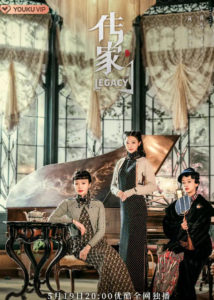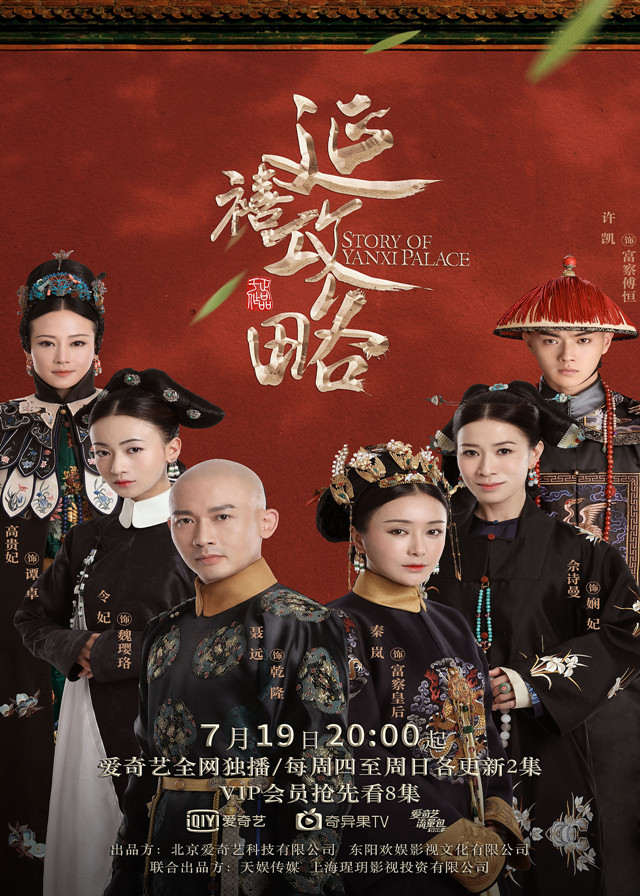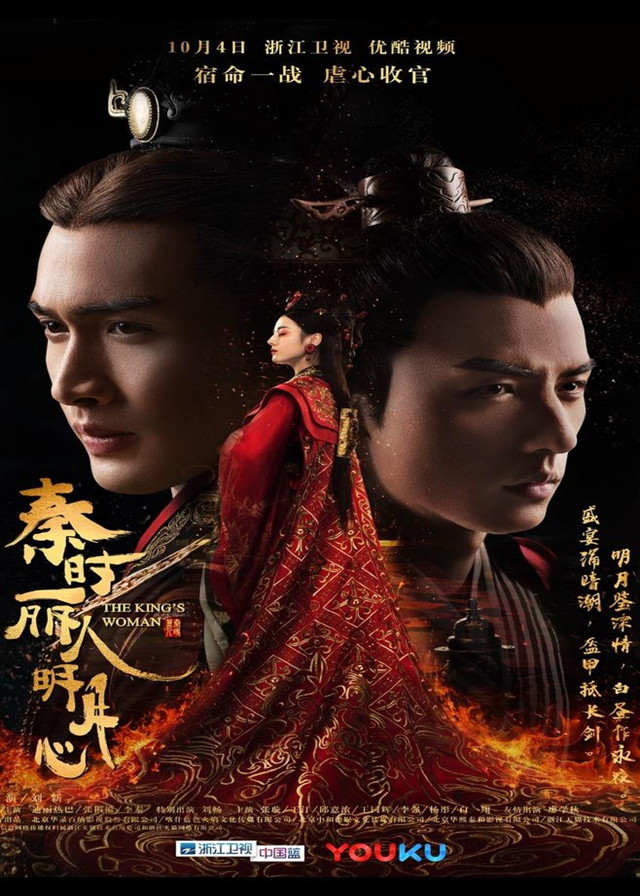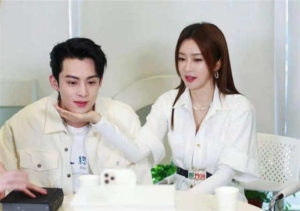Story of Yanxi Palace Episode 33 Recap
> Story of Yanxi Palace Recap
- 1
- 2
- 3
- 4
- 5
- 6
- 7
- 8
- 9
- 10
- 11
- 12
- 13
- 14
- 15
- 16
- 17
- 18
- 19
- 20
- 21
- 22
- 23
- 24
- 25
- 26
- 27
- 28
- 29
- 30
- 31
- 32
- 33
- 34
- 35
- 36
- 37
- 38
- 39
- 40
- 41
- 42
- 43
- 44
- 45
- 46
- 47
- 48
- 49
- 50
- 51
- 52
- 53
- 54
- 55
- 56
- 57
- 58
- 59
- 60
- 61
- 62
- 63
- 64
- 65
- 66
- 67
- 68
- 69
- 70
Having covered for Wei Yingluo, who had arranged the attack on Noble Consort Gao, Yuan Chunwang earned her complete trust. Moved by his willingness to risk his life for her, Yingluo sincerely accepted him as her sworn brother, promising to share all fortunes and hardships. Overjoyed, Yuan Chunwang insisted on a formal ceremony, complete with written oaths and tablets honoring heaven and earth.
Citing their lowly status in the Labour House, Yingluo suggested they keep it simple, but he proudly refused, determined to honor the occasion of finally having a sister. Later, while working, Yingluo overheard maids discussing Noble Consort Gao’s death and the Empress’s deteriorating condition from a persistent fever. Though she had publicly disavowed the Empress, Yingluo was deeply worried. The maids' conversation was, in fact, a ruse orchestrated by Fu Heng to lure her out.
When Yingluo snuck into Changchun Palace that night, Fu Heng caught her. He noted that as the Empress's former head maid, she could have visited openly, and her sneaking in proved she still cared. He then informed her that during Mingyu's shifts, the Empress's chambers would be empty at midnight, allowing her to visit.
Moved despite her tough exterior, Yingluo listened as Fu Heng professed he would wait for her to let go of her burdens, even if it took a lifetime. After she left, Mingyu thanked Fu Heng and asked if Yingluo had truly orchestrated Gao's demise as revenge for the Empress. Fu Heng was noncommittal, stating only that Yingluo's visit showed she still had a conscience and that Mingyu should continue to grant her access.
Following the funeral of Imperial Noble Consort Huixian, the Emperor was filled with remorse for never having given Noble Consort Gao true affection. Consort Xian, sensing his coldness towards her, suppressed her own sorrow and magnanimously offered to oversee the complex funeral arrangements, suggesting they follow the precedent of a previous Imperial Noble Consort. Impressed by her dedication, the Emperor agreed but felt no romantic inclination.
Shortly after, Xian’s maid, Zhen’er, revealed to the Emperor that her mistress had been hiding a severe illness, suffering from a high fever, a cough, and a festering wound while managing affairs. Stricken with guilt, the Emperor ordered her to rest, but Xian insisted on continuing her duties. She argued that with the Empress ill and Gao's death causing turmoil, she could not abandon her post, promising to rest only after the funeral was over.
Later, the Empress Dowager praised Xian to the Emperor for her virtue and diligence, even in the face of Gao's past bullying. Highlighting Xian's devotion, she urged the Emperor to cherish the one beside him. Taking the hint, the Emperor issued a decree promoting Consort Xian of the Hoifa-Nara clan to the rank of Noble Consort. At midnight, Yingluo stole into Changchun Palace. To her surprise, the Emperor also arrived, seeking solace by the Empress’s bedside, forcing Yingluo to hide.
He confessed his loneliness to the unconscious Empress, admitting that in the vast Forbidden City, she was the only one he could truly talk to. He spoke of Noble Consort Gao’s death and his inability to give her the love she craved, only a title.
He recounted how his father had his beloved childhood friend, Wan'er, executed over a trifle, a brutal lesson that an emperor can show favor but never true love, as such affection could be a death sentence. As he spoke, he sensed another presence and feigned his departure. Yingluo emerged from hiding, only to be caught. She claimed she had come to visit and panicked when she heard him.
The Emperor warned that without the Empress’s protection, he could have her killed. Thinking fast, Yingluo cried out that the Empress's hand had moved. As the Emperor turned to look, she fled. Meanwhile, a precious healing balm was sent to Noble Consort Xian to treat her wound and prevent scarring. She callously poured it on a plant, declaring that she wanted the scar to remain as a permanent reminder to the Emperor of the sacrifice she made for him.
Elsewhere, Consort Chun encountered Fu Heng. She warned him that his frequent visits to Changchun Palace were fueling gossip. She then confronted him about the "rumor" of his infatuation with Wei Yingluo, which she dismissed as absurd. Fu Heng calmly confirmed, "It's not a rumor." Angered, Chun warned him not to let a mere woman jeopardize his brilliant future, but he cut her off, telling her she had overstepped her bounds.
Back in her palace, a despairing Consort Chun tore a painting and began writing "Chun He"—a reference to a shared memory with Fu Heng. Her maid warned that she could be beheaded if discovered. Heartbroken, Chun lamented that Fu Heng remembered nothing, making her years of devotion a "joke." She confessed she had even scouted the best maidens in the capital for him, only for him to fall for a common servant.
Consuming with rage and jealousy, she ordered her maid to summon the supervisor of the Labour House, intending to punish Yingluo. Upon learning of his daughter's suicide, Gao Bin petitioned to return to the capital for her funeral. The Emperor erupted in fury, berating Gao Bin's son for his father’s request. With Jiangxi suffering from a devastating flood and relief officials mired in corruption, he condemned Gao Bin for prioritizing personal grief over his duty.
The Emperor decreed that Gao Bin be stripped of his title but forced to continue his work to atone for his crimes. Tormented by the flood and the suffering of his people, the Emperor sought refuge at Changchun Palace. Mingyu, seeing him, nervously promised she would no longer let Yingluo in. The Emperor asked if she was there, and Mingyu admitted she was in the backyard.
At that moment, Yingluo appeared, openly carrying medicine she had procured from Physician Ye as a pretext to visit. The Emperor, surprisingly calm, allowed her to stay. He argued that as a ruler responsible for millions, he could not be consumed by personal feelings, unlike his consorts who only sought titles and favor. Yingluo countered that the Empress was different; she sought genuine affection.
She then challenged him, explaining that women are confined in "cages" forged by men and thus cannot be expected to have the broad perspective of an eagle. Taken aback, the Emperor recited one of his poems, and to his astonishment, Yingluo recited it back. She explained that the Empress had taught her all his poetry, not for its literary merit, but to understand his every thought and feeling.
She praised him as a "good Emperor" and recited a folk rhyme that proved the common people remembered his benevolence. She urged him to tackle the empire’s problems one by one, assuring him that as long as he acted with a clear conscience, he would succeed. Finally, she suggested that in the Empress, he would always have a soulmate to confide in.
His mood softened, until he seized on her earlier comment about his poetry not being "outstanding" and grew angry at her audacity. Yingluo quickly excused herself and left. Later, the Emperor summoned his ministers, Heng Chen and Ortai. Citing the treasury's ample reserves from memory, he announced his intention to remit all taxes nationwide. The ministers protested, warning that government and military expenses left no room for such a measure, which would cause a severe shortfall.
The Emperor defended his decision by invoking his ancestors' benevolence. A minister respectfully pointed out that Emperor Kangxi had issued a similar decree only in his 49th year of rule, implying that after only a decade on the throne, the Emperor was being too impatient.














